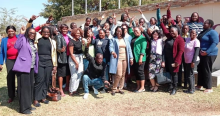Empowering Frontline Health Workers to Address GBV In Namibia
In Namibia, nearly 35% of women are subjected to intimate partner violence and/or sexual violence. The majority do not disclose the abuse but may seek health care because of the abuse. This makes the health sector a critical player in the prevention and response to violence against women.
The capacity of health workers to provide comprehensive quality care for women subjected to intimate partner violence and the conditioning of the health sector to be more responsive to the peculiar needs of survivors of gender-based violence has been a key priority for the Ministry of Health and Social Services (MoHSS) in partnership with the World Health Organization (WHO) and United Nations Population Fund (UNFPA). To date, over 300 healthcare providers in all 14 regions have been trained on the Clinical Handbook for the Health Care of Survivors Subjected to Intimate Partner Violence and/or Sexual Violence.
This year, the Government of Japan provided funding to WHO to intensify its support to the MoHSS in strengthening the health sector's response to violence against women and children. MoHSS prioritized the administration officers as the first contact points at health facilities. This approach aimed to enhance their understanding of the complexities of gender-based violence (GBV), the necessity for empathetic service, and the importance of ensuring confidentiality. A total of 58 administrators from all 14 regions were trained, focusing on awareness of guiding principles for survivor-centered care, identifying and understanding the behaviors of GBV survivors, and how to respond appropriately within a healthcare setting.
The first training series was held in July in Otjiwarongo, followed by a second session in August in Swakopmund. Welcoming participants, Dr. Anna Jonas, the Erongo Regional Director for MoHSS emphasized that “since GBV is a public health concern, health facilities are regarded as the entry level for those who have experienced violence”. “It is thus of vital importance to strengthen the capacity of all staff members and to increase their knowledge and awareness on the role of the health sector in responding to GBV,” she added.
Participants learned about GBV as a public health concern, focusing on recognizing and understanding survivor behavior. The training included guidance on supporting sexual violence victims and contextualizing the Clinical Handbook. During the training, pre-and post-assessments were administered, increasing participants’ knowledge, with scores rising from 42% to 51%. The training further highlighted the significance of a GBV survivor-centered approach in healthcare settings and how it will help improve the quality of care provided to survivors of GBV.
Ms. Else Kuuova, WHO consultant on GBV, emphasized the crucial role health systems play in addressing violence against women. She stated that they need to be well-equipped to provide compassionate and comprehensive care for survivors. “Empowering administrators to recognize and respond to GBV is essential; it not only saves lives but also restores hope for many survivors,” she added.
It was recommended that the training be expanded to all administrators and other health workers to ensure a comprehensive and coordinated GBV response across all levels of healthcare. WHO is committed to supporting MoHSS in implementing initiatives to address GBV in the country.

